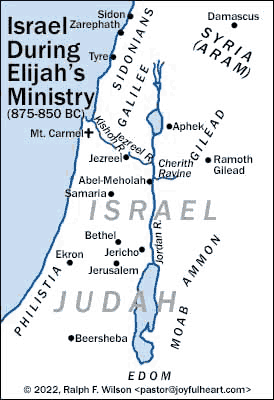
|
Old Testament
New Testament
Gospels
Acts
Paul's Letters
General Letters
Revelation
Topical Studies
Beginning the Journey (for new Christians). en Español

|
Old Testament
New Testament
Gospels
Acts
Paul's Letters
General Letters
Revelation
Topical Studies

|
Home
Bible Studies
Articles
Books
Podcasts
Search
Menu
Donate
About Us
Contact Us
FAQ
Sitemap
|
Ralph F. Wilson, 'Elijah' (2022), original watercolor, 10 x 14 in., private collection. |
"The Elijah Cycle," as the series of Elijah stories are called, forms a significant portion of the overall Book of Kings.
The Book of Kings is part of what the Jews call the "Former Prophets," the historical books that cover the period from David's reign to the Exile (Joshua, Judges, Samuel, and Kings).
Initially, the Book of Kings was a single book in the Hebrew Bible, but was divided into First Kings and Second Kings in translations into Greek (the Septuagint) and Latin (the Vulgate),1 mainly for "mechanical convenience," that is, because of the limitations of the effective length of a scroll or book (codex).
Nature of 1 & 2 Kings
Nowhere does the Bible tells us who wrote 1 & 2 Kings. It appears to be compiled from official records of the united kingdom under Solomon, and the divided kingdoms of Judah (south) and Israel (north). The period covers the ascension of Solomon in about 970 BC to the fall of Judah in 587 BC. The reigns of the kings of the northern and southern kingdoms are summarized in a formulaic manner -- the year of their accession and death given in relation to other reigns, and usually some judgment given on how faithful they were to Yahweh. In addition, there are fuller stories that develop some of the key characters -- Solomon, Jeroboam, Ahab, Elijah, Elisha, Jeremiah, Jehoshaphat, Josiah, and others. Wiseman observes:
"In a variety of incidents, which could well have been treasured memories retained by groups of prophets and recorded in prophetic memoirs, as for Samuel, Nathan, and Ezra, a vivid and memorable picture is portrayed."2
Theological Purpose
 Israel in the Time of Elijah. Larger map. |
But this is not just a chronological record of events. The author or authors had a theological purpose in mind, thus they skip over many events, referring the reader to the official chronicles. But they spend time explaining events that have to do with the spiritual and moral life of the nation. 1 and 2 Kings are a record of the acts of righteous leaders and the sins of wicked leaders. Those who have been faithful to Yahweh are praised and those who have backslidden and embraced the Canaanite religions of Baal and Asherah worship are condemned. 1 and 2 Kings are intended to instruct the reader in the importance of faithfulness in serving Yahweh.
Elijah's role in this overall purpose is capsulized by Wiseman:
"Elijah is presented as Moses redivivus [reborn] fighting for the purity and continuance of the worship of the Lord amid idolatry and intrusive synthetic acknowledgement of foreign gods."3
Date and Author
How and when were 1 and 2 Kings written? Edward Ball explains,
"Kings is essentially a compilation from a variety of sources, though not in any simple, mechanical sense; the sources are, rather, molded together to produce a new work, which from a literary point of view is a single whole, or part of a much larger whole, with a coherent message for its own time (and for subsequent generations of God's people)."4
There is debate about the authorship. Essentially, there are three theories.
- Single historian. One view is that there was a single person who assembled the available materials into 1 and 2 Kings. Jewish tradition attributes this to Jeremiah.5 A few modern-day scholars see the hand of a single compiler.6
- Double Redaction. A second view proposes a major edition in the time of Josiah and another during the Exile. The term "redaction" refers to the process of composition and editing whereby the varied source materials were combined to give a work its final shape.
- Triple Redaction. A third view argues editing in the time of Josiah, and then another two editions or redactions during the exilic and post-exilic periods.7
These remain theories. The Bible doesn't tell us. Nor is there any way to really prove any of them. No view is no more or less "conservative" or "liberal" than the others. It is quite clear to me that some editor pulled together the materials from a number sources. And it wouldn't surprise me if there was some re-editing later on. More than that we can't say with any confidence. Since the process is clouded by the mists of time, there is no way to know the "original" or "final" date of authorship with any precision, nor is it particularly important to interpreting the text.
Historical Situation
After the united kingdom under David and Solomon, God's people divide into two kingdoms, Judah with its capital in Jerusalem (the southern kingdom) and Israel with its capital in Samaria (the northern kingdom). The focus of Elijah's ministry is the northern kingdom, which faces a powerful royal-sponsored move away from Yahweh worship in favor of Baal worship. During Elijah's ministry, there are military pressures from the Syrians primarily centered in Damascus, though the Moabites rebel and the Assyrian threat is growing throughout the region. I'll spell out the history in greater detail as we consider the text.
Chronology of 1 and 2 Kings
One difficulty in studying 1 and 2 Kings is the chronology. In addition to the Bible record, there are several historical points that can be fixed from external sources -- the Mesha' Inscription (Moabite Stone, about 830 BC), the Battle of Qarqar (853 BC), the Black Obelisk from Kalhu (841 BC), and records of various Assyrian kings (Tiglath-pileser III, Shalmaneser V, Sargon II, Sennacherib, Esarhaddon), and the Babylonian Chronicle tablets for the years 625-595 BC.
The problem we face is that the beginning and end dates of the reigns of each of the kings given in 1 and 2 Kings add up to too many years. This has been pretty well solved by Edwin Thiele, who sees the answer in periods of co-regencies at the beginning and end of the reigns of some kings that allow us to harmonize the records in 1 & 2 Kings with the fixed points we have.8
 Available in paperback, PDF, and Kindle formats. |
In studying the life of Elijah then, we're pretty sure of the dates of the reign of Ahab, for example, between 873 and 853 BC, placing the ministry of Elijah approximately about 870 to 849 BC.
Elijah's ministry is almost entirely directed toward the spiritually divided northern kingdom of Israel. His goal was to turn an entire nation back to Yahweh. How God uses Elijah to do this provides a fascinating story that has much to teach disciples today.
Copyright © 2026, Ralph F. Wilson. <pastor![]() joyfulheart.com> All rights reserved. A single copy of this article is free. Do not put this on a website. See legal, copyright, and reprint information.
joyfulheart.com> All rights reserved. A single copy of this article is free. Do not put this on a website. See legal, copyright, and reprint information.


 To be notified about future articles, stories, and Bible studies, why don't you subscribe to our free newsletter, The Joyful Heart, by placing your e-mail address in the box below. We respect your
To be notified about future articles, stories, and Bible studies, why don't you subscribe to our free newsletter, The Joyful Heart, by placing your e-mail address in the box below. We respect your